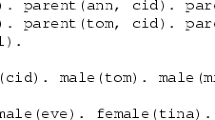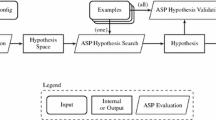Abstract
Despite the considerable success of Inductive Logic Programming (ILP), deployed ILP systems still have efficiency problems when applied to complex problems. Several techniques have been proposed to address the efficiency issue. Such proposals include query transformations, query packs, lazy evaluation and parallel execution of ILP systems, to mention just a few. We propose a novel technique that avoids the procedure of deducing each example to evaluate each constructed clause. The technique takes advantage of the two stage procedure of Mode Directed Inverse Entailment (MDIE) systems. In the first stage of a MDIE system, where the bottom clause is constructed, we store not only the bottom clause but also valuable additional information. The information stored is sufficient to evaluate the clauses constructed in the second stage without the need for a theorem prover. We used a data structure called Trie to efficiently store all bottom clauses produced using all examples (positive and negative) as seeds. The technique was implemented and evaluated using two well known data sets from the ILP literature. The results are promising both in terms of execution time and accuracy.
Preview
Unable to display preview. Download preview PDF.
Similar content being viewed by others
References
Muggleton, S.: Inductive logic programming. New Generation Computing 8(4), 295–317 (1991)
Ilp applications. http://www.cs.bris.ac.uk/~ILPnet2/Applications/
Nédellec, C., Rouveirol, C., Adé, H., Bergadano, F., Tausend, B.: Declarative bias in ILP. In: De Raedt, L. (ed.) Advances in Inductive Logic Programming, pp. 82–103. IOS Press, Amsterdam (1996)
Camacho, R.: Improving the efficiency of ilp systems using an incremental language level search. In: Annual Machine Learning Conference of Belgium and the Netherlands (2002)
Blockeel, H., Dehaspe, L., Demoen, B., Janssens, G., Ramon, J., Vandecasteele, H.: Improving the efficiency of Inductive Logic Programming through the use of query packs. Journal of Artificial Intelligence Research 16, 135–166 (2002)
Costa, V.S., Srinivasan, A., Camacho, R.: A note on two simple transformations for improving the efficiency of an ILP system. In: Cussens, J., Frisch, A.M. (eds.) ILP 2000. LNCS (LNAI), vol. 1866, Springer, Heidelberg (2000)
Costa, V.S., Srinivasan, A., Camacho, R., Hendrik, Van Laer, W.: Query transformations for improving the efficiency of ilp systems. Journal of Machine Learning Research (2002)
Camacho, R.: Inductive Logic Programming to Induce Controllers. In: PhD thesis, Univerity of Porto (2000)
Fonseca, N.A., Silva, F., Camacho, R.: Strategies to Parallelize ILP Systems. In: Kramer, S., Pfahringer, B. (eds.) ILP 2005. LNCS (LNAI), vol. 3625, pp. 136–153. Springer, Heidelberg (2005)
Muggleton, S.: Inverse Entailment and Progol. New Generation Computing, Special issue on Inductive Logic Programming 13(3-4), 245–286 (1995)
Muggleton, S.: Inverse Entailment and Progol. New Generation Computing, Special issue on Inductive Logic Programming 13(3-4), 245–286 (1995)
Aleph, http://web.comlab.ox.ac.uk/oucl/research/areas/machlearn/Aleph/
Fonseca, N.A., Silva, F., Camacho, R.: April - An Inductive Logic Programming System. In: Fisher, M., van der Hoek, W., Konev, B., Lisitsa, A. (eds.) JELIA 2006. LNCS (LNAI), vol. 4160, pp. 481–484. Springer, Heidelberg (2006)
Fonseca, N.A., Rocha, R., Camacho, R., Silva, F.: Efficient Data Structures for Inductive Logic Programming. In: Horváth, T., Yamamoto, A. (eds.) ILP 2003. LNCS (LNAI), vol. 2835, pp. 130–145. Springer, Heidelberg (2003)
Nijssen, S., Kok, J.N.: Faster Association Rules for Multiple Relations. In: Proceedings of the 17th International Joint Conference on Artificial Intelligence (IJCAI 2001), pp. 891–896 (2001)
Dehaspe, L., De Raedt, L.: Mining Association Rules in Multiple Relations. In: Džeroski, S., Lavrač, N. (eds.) ILP 1997. LNCS, vol. 1297, pp. 125–132. Springer, Heidelberg (1997)
Fredkin, E.: Trie Memory. Communications of the ACM 3, 490–499 (1962)
Bachmair, L., Chen, T., Ramakrishnan, I.V.: Associative-Commutative Discrimination Nets. In: Gaudel, M.-C., Jouannaud, J.-P. (eds.) CAAP 1993, FASE 1993, and TAPSOFT 1993. LNCS, vol. 668, pp. 61–74. Springer, Heidelberg (1993)
Graf, P.: Term Indexing. In: Graf, P. (ed.) Term Indexing. LNCS, vol. 1053, Springer, Heidelberg (1996)
Ramakrishnan, I.V., Rao, P., Sagonas, K., Swift, T., Warren, D.S.: Efficient Access Mechanisms for Tabled Logic Programs. Journal of Logic Programming 38(1), 31–54 (1999)
Yamamoto, A.: Which Hypotheses Can Be Found with Inverse Entailment? In: Džeroski, S., Lavrač, N. (eds.) ILP 1997. LNCS, vol. 1297, pp. 296–308. Springer, Heidelberg (1997)
Author information
Authors and Affiliations
Editor information
Rights and permissions
Copyright information
© 2008 Springer-Verlag Berlin Heidelberg
About this paper
Cite this paper
Camacho, R., Fonseca, N.A., Rocha, R., Costa, V.S. (2008). ILP :- Just Trie It. In: Blockeel, H., Ramon, J., Shavlik, J., Tadepalli, P. (eds) Inductive Logic Programming. ILP 2007. Lecture Notes in Computer Science(), vol 4894. Springer, Berlin, Heidelberg. https://doi.org/10.1007/978-3-540-78469-2_11
Download citation
DOI: https://doi.org/10.1007/978-3-540-78469-2_11
Publisher Name: Springer, Berlin, Heidelberg
Print ISBN: 978-3-540-78468-5
Online ISBN: 978-3-540-78469-2
eBook Packages: Computer ScienceComputer Science (R0)




